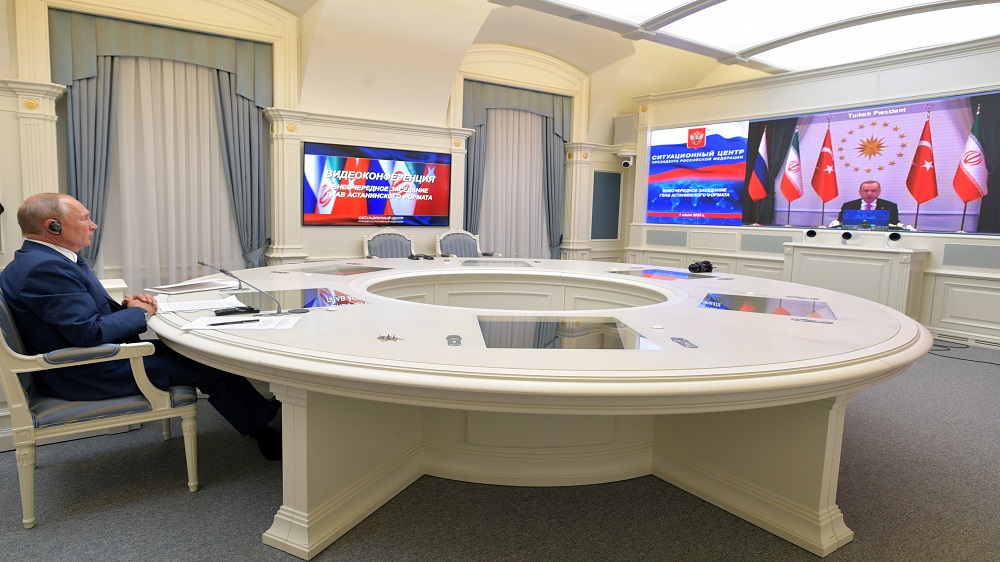Iran, Russia Turkey in talks to find political solution for Syria

Opposing sides in Syria’s war Iran, Russia and Turkey have held talks reflecting “harmonised” efforts to bring peace to the country after nine years of devastating conflict.
During a meeting held on Wednesday, the three sides “expressed the conviction” that Syria’s war had no military solution and must be settled only through a political process, a joint statement said.
In the virtual meeting, Russian President Vladimir Putin denounced newly imposed US sanctions that he said were aimed at “suffocating” Syria, while Turkey’s President Recep Tayyip Erdogan called for peace and security to be restored in his country’s southern neighbour.
The talks were the first since September in the so-called Astana format, three-way talks between the key foreign powers in the Syrian conflict.
In early March, an agreement between Turkey and Russia halted the Syrian government’s three-month air and ground campaign into rebel-held Idlib province. The ceasefire has largely held.
Iran and Russia have been staunch supporters of President Bashar al-Assad, while Turkey has called for the removal of his government and backed opposition fighters.
Rouhani told the conference “the Islamic republic believes the only solution to the Syrian crisis is political and not a military solution”.
“We continue to support the inter-Syrian dialogue and underline our determination to fight the terrorism of Daesh [ISIL, ISIS], al-Qaeda and other related groups,” he said.
“I emphasise that the fight against terrorism will continue until it is completely eradicated in Syria and the region in general.”
Rouhani used the call to urge the United States to withdraw its troops from Syria to allow al-Assad’s government to fully reclaim control of the country’s territory.
Some American forces have remained in Syria to protect an expanse of Kurdish-controlled oil fields and facilities from falling into the hands of the Islamic State group.
‘Tense situation’
Putin said the objective of the conference was to analyse the situation and agree on steps “to ensure the long-term normalisation in Syria”.
“Above all, it is a question of continuing the fight against international terrorism,” he said.
“The most-tense situation is still being observed in territories outside the control of the Syrian army, particularly in the de-escalation zone of Idlib and in northeastern Syria”.
“We need to actively help advance an inclusive inter-Syrian dialogue,” said the Russian leader.
Idlib is held by armed groups, some of them backed by Turkey, which has deployed forces in several military posts in the region as part of a 2018 deal with Russia.
Putin also denounced as “illegitimate” a new raft of US sanctions against Syria, highlighting “the negative impact of the sanctions put in place against Syria, bypassing the UN Security Council”.
The Caesar Act, which took effect in mid-June, punishes under US law any country, individual or entity that does businesses with al-Assad’s government.
The sanctions are the toughest set of measures to be imposed on Syria yet, preventing anyone around the world from doing business with Syrian officials or state institutions, or from participating in the country’s reconstruction.
The measures have cast a cloud over efforts to rebuild the war-ravaged country.
“Despite the call from the UN Secretary-General [Antonio Guterres] for easing the pressure of sanctions under pandemic conditions, Washington like Brussels decided to prolong measures against Syria,” Putin told the conference.
“In addition, new sanctions presumably aimed at economically suffocating Syria have been adopted.”
Turkish President Erdogan attends the video conference call with Russia and Iran on Wednesday [Murat Kula/Turkish Presidential Press Office/Reuters]
Erdogan said Turkey’s “fundamental priorities are to safeguard Syria’s political unity and territorial integrity, restore peace on the ground and find a lasting political solution to the conflict”.
“We will continue to do what we can to restore peace and security to our neighbour Syria as soon as possible,” said the Turkish president.
As well as Idlib, Turkey also controls a stretch of territory along its border in neighbouring Aleppo province following a series of military offensives since 2016.
All three parties welcomed a meeting of the Syrian constitutional committee in August, a gathering that is meant to be a step forward in what the United Nations says will be a long road to political rapprochement, followed by elections.
They agreed to hold the next trilateral summit on Syria in Iran, but gave no date, saying it would meet when possible.
The conflict in Syria has killed hundreds of thousands of people and displaced millions since it began in March 2011.






